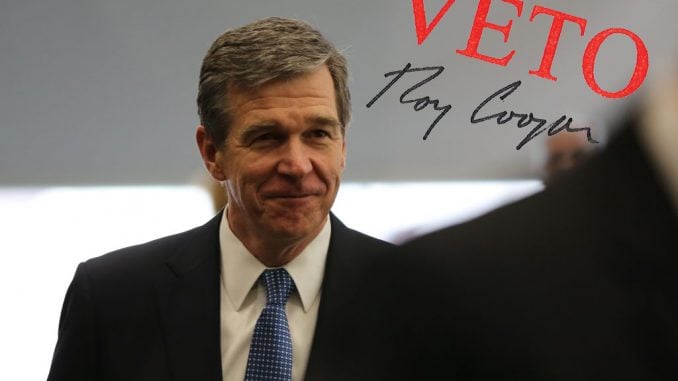
RALEIGH — Gov. Roy Cooper vetoed Senate Bill 824 on Friday. The bill was enacted by the General Assembly to implement the recently-approved constitutional amendment which would require all voters to present a valid photo ID before voting. The amendment, which was approved by N.C. voters in the November election with 55.5% support, cannot not be implemented without additional legislation.
In his veto statement, Gov. Cooper called requiring photo identification “a solution in search of a problem.”
Speaker of the House Tim Moore (R-Kings Mountain) issued a statement immediately after the veto. “We are disappointed that Gov. Cooper chose to ignore the will of the people and reject a commonsense election integrity measure that is common in most states,” said Moore. “The North Carolina House will override his veto as soon as possible.”
Cooper pointed to other voter and election fraud issues in his statement. “The real election problem is votes harvested illegally through absentee ballots, which this proposal fails to fix,” said Cooper.
The Governor also claimed the vetoed legislation “puts up barriers to voting that will trap honest voters in confusion and discourage them with new rules, some of which haven’t even been written yet.”
Cooper attacked what he called “sinister and cynical origins” of the bill. “It was designed to suppress the rights of minority, poor and elderly voters,” said Cooper.
“Governor Cooper’s veto explanation for the reasonable and bipartisan voter ID bill is a tired rehash of unconvincing talking points rejected by the voters,” said Sen. Phil Berger (R-Rockingham). “Despite the Governor’s personal feelings on voter ID, the fact remains that the constitutional amendment passed with a broad mandate from North Carolinians.”
Berger, the President Pro Tempore of the N.C. Senate said that Cooper was “putting special interests ahead of the people’s will, and we plan to override the veto.”
Lieutenant Governor Dan Forest said having photo identification “is not only necessary to be an active member of our society, it is constitutionally required to vote, as determined by a majority of North Carolinians.” Forest, widely considered to be a 2020 Republican opponent to Cooper for the Governor’s mansion, called Cooper’s veto a partisan move. “To put partisanship ahead of common sense is not only bad for our state, it is not the leadership our state needs,” said Forest. “I hope our General Assembly will swiftly override this veto to ensure our state’s constitution is upheld.”
Based on statements from Berger and Moore, the General Assembly leaders believe they have the votes to override the Governor’s veto and intend to do so soon. According to the Speaker’s office, thirty-four other U.S. states have some form of voter ID law. North Carolina is the last state in the South to implement voter ID requirements.



